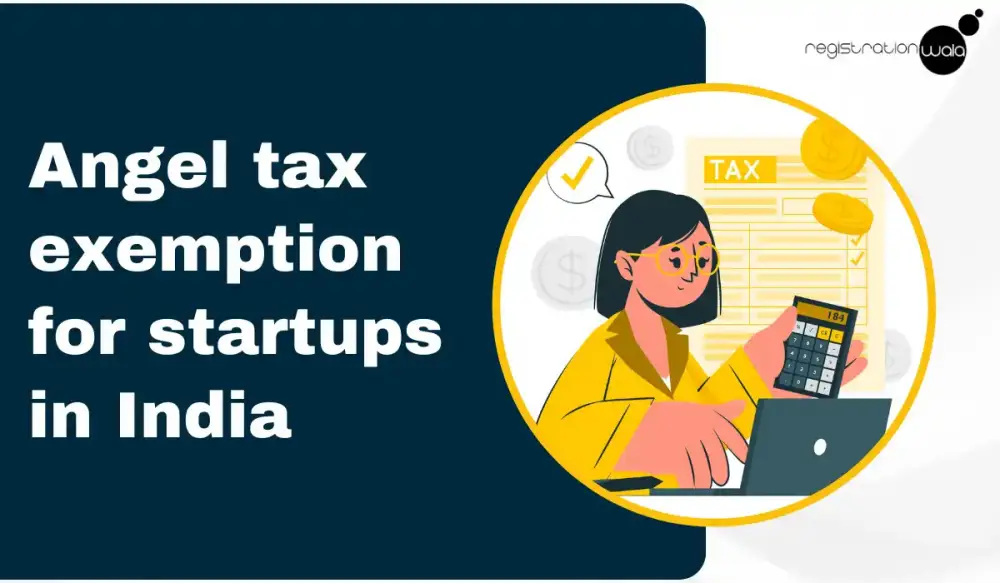Angel tax exemption for startups in India
- June 20, 2016
- Registrationwala

- Home
- /
- Knowledge Base
- /
- Start ups
- /
- Business Tips
- /
- Angel tax exemption for startups in India
Angel tax exemption for startups in India
Angel Tax has been one of the most discussed taxes of 2024. The Budget 2024 proposed to abolish this tax for all categories of investors for FY 25-26. But for now, this tax is still applicable. However, even now certain eligible startups can seek angel tax exemption from the Department of Indus Industrial Policy & Promotion (DIPP). In this blog post, we will discuss what is angel tax.
What is Angel Tax in India?
Angel Tax is the tax levied on money raised by startups from angel investors. It is officially known as Section 56 (2) (vii b) of the Income Tax Act. This only applies to funds that are greater than the company's fair market worth, though.
Currently, Angel tax rate in India is 30%. If a business receives Rs 1.5 crore from angel investors and has a fair value of Rs 1 crore, the excess of Rs 45 lakh is liable to this tax. The premium that investors paid was regarded by tax authorities as income and was subject to the 30% tax rate.
Angel Tax Exemption for Eligible Startups
Certain eligible startups in India can request for angel tax exemption. The government eased the angel tax regulations in the 2019 Union budget by requiring that startups registered with the Department for Promotion of Industry and Internal Trade (DPIIT) be exempt from the clause. However, the fine print made it clear that not all of these startups were excluded. Only those certified by the Inter-Ministerial Board (IMB), a government agency, were covered. IMB is a team of bureaucrats that certifies whether a company is innovative enough to qualify for benefits under the 1961 Income Tax Act.
Eligibility Criteria for Angel Tax Exemption
Here is the criteria for angel tax exemption for startups:
-
The average income of angel investors should not exceed Rs 25 lakh.
-
Fair market value must be procured by the startup and should be certified by a merchant banker.
-
Startup should have a net worth of Rs 2 crore in the previous 3 fiscal years.
-
The startup should have approval from IMB for angel tax exemption.
Abolishment of Angel Tax for FY 25-26
With the Union Budget 2024 came the announcement of abolition of angel tax from FY 2025-26 to accelerate the growth of the startup ecosystem in the country. Clause 23 of the Finance Act, 2024 seeks an amendment to the Income Tax Act, 1961 which will make the provision of angel tax ineffective from 1st April, 2025.
The elimination of the angel tax appears to be a step towards boosting startup investments and creating an atmosphere that is more supportive to the expansion of entrepreneurs in India. This shift, however, raises some serious questions regarding the possibility of black money being generated through these kinds of investments. Because of this, it is essential for the government to find a balance between regulating suspicious activities and fostering an atmosphere that encourages startup growth by easing the financial and tax load on them.
Conclusion
Angel tax is one of the most dreaded taxes for investors, having a tax rate of 30%. However, certain eligible startups can obtain angel tax exemption in India if they are certified by the Inter-Ministerial Board. From 1st April, 2025, the angel tax will be abolished for all the investors as decided in the Union Budget 2024. This will boost the growth of startups in India, and ultimately, boost the Indian economy.
For startup registration in India in a smooth and easy manner, connect with Registrationwala.
Frequently Asked Questions (FAQs)
Q1. Do startups have to pay tax?
A. Yes, they generally have to pay tax unless they’re registered with DPIIT. After getting recognition as a startup by DPIIT, the business may apply for Tax exemption under section 80 IAC of the Income Tax Act.
Q2. Who is an angel investor?
A. An angel investor means a wealthy person who contributes their own funds to a startup or early-stage company in return for convertible debt or ownership equity.
Q3. When will Angel Tax become ineffective in India?
A. From 1st April, 2025 onwards, the angel tax will become ineffective in India.
Q4. What is the difference between angel investors and venture capitalists?
A. Both angel investors and venture capitalists are investors who invest in startups. However, the difference between them lies in the fact that angel investors use their own money to invest in startups while venture capitalists invest on behalf of a risk capital company, where they invest money of other people.
Post updated on : 19-10-2024
- 3116 views
